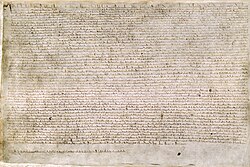Magna Carta
| It's the Law |
| To punish and protect |
The Magna Carta document limited the power of the English throne. It was enacted by King John of England in 1215. While the Magna Carta codified the rights of only a specific group of people (the nobility of England), its creation is believed to be a pivotal moment in the history of English Common law and in the development of Western democracy and human rights.
In the modern world[edit]
Freemen on the land often apply its principles incorrectly and fail to understand this document is no longer in force, except for four provisions, one of which has been mostly replaced by newer legislation anyways.[1] The three provisions that do remain in force in their entirety are the clauses that enshrine the liberty of the English church, the "liberties and customs" of London and other municipalities, and the rights to a fair trial and a jury.[2]
In January 2012, Republicans in the New Hampshire state legislature proposed a bill mandating that certain legislation reference the Magna Carta.[3] The bill was roundly mocked[4][5][6] and ultimately failed.[7]
Lawful rebellion[edit]
The Magna Carta, and especially article 61, is interpreted creatively by various tax protestors and other people who believe it entitles them to "lawful rebellion", a process which allows them to ignore all laws and not pay taxes[8] (but still enjoy the public services that taxes pay for). The website Direct Democracy includes instructions as to how you can inform Her Majesty's Revenue and Customs of your invocation of article 61, which will result in you not having to pay tax.[9] Don't try this at home. Especially since article 61 lasted a month before it was annulled by a Papal Bull.[10]
Boxer Oliver "The Ringmaster" Pinnock was jailed for 25 days in 2017 after arguing that article 61 implied that the council could not impose tax without a contractual agreement. The council differed and pointed to legislation giving it the power to levy taxes.[11]
In 2010 someone called Graeme MacLean submitted a freedom of information request to the British government saying: "Can you confirm that Article 61 of The Magna Carta Of 1297 is still in force and that as such it is still legal to enter into lawful rebellion against parliament." The government declined to confirm this.[12] The 1297 version only has 37 articles.[13]
Women and the Magna Carta[edit]
The Magna Carta is not friendly to the rights of women, being at best rather ambivalent.[14] While some clauses seek to protect the rights of widows, such as the right for a widow to retain possession of her dowry,![]() and not be compelled to pay the "debts of her dead husband," these protections for widows were ultimately intended to protect the "inheritances of underage heirs." The protection of the rights of widows were ultimately just a means to an end.[14] In other ways, the Magna Carta actually restricts the rights and privileges of women. Clause 3 restricts the right of women to accuse anyone of murder if the victim was not her husband.[14]
and not be compelled to pay the "debts of her dead husband," these protections for widows were ultimately intended to protect the "inheritances of underage heirs." The protection of the rights of widows were ultimately just a means to an end.[14] In other ways, the Magna Carta actually restricts the rights and privileges of women. Clause 3 restricts the right of women to accuse anyone of murder if the victim was not her husband.[14]
See also[edit]
External links[edit]
References[edit]
- ↑ "The contents of Magna Carta". UK Parliament.
- ↑ Eleftheriou-Smith, Loulla-Mae (February 2, 2015). "Magna Carta: What is it – and why is it still important today?". The Independent.
- ↑ HB-1580
- ↑ "New Hampshire GOP Bill Mandates that Laws find their Origin in 1215 English Magna Carta", Think Progress
- ↑ "America Could Use Some More Magna Carta, Say New Hampshire Lawmakers", New york Magazine
- ↑ "New Hampshire GOP Debates: Moderate Extremes", Colbert Nation
- ↑ Magna Carta bill fails to clear committee, Concord Monitor
- ↑ Lawful Rebellion is a myth, wonkosworld.co.uk, Oct 24, 2015
- ↑ Direct Democracy and Tax [the Magna Carta and lawful rebellion], Direct Democracy
- ↑ "The papal bull annulling the Magna Carta" - Collection Objects of the British Library. Archived version.
- ↑ Boxer jailed after trying to use the Magna Carta to avoid council tax, Daily Express, May 8, 2017
- ↑ Request: Right to Lawful rebellion, WhatDoTheyKnow.com
- ↑ 1297 version of the Magna Carta
- ↑ 14.0 14.1 14.2 Bennett Connolly, Sarah (July 15, 2020). "Sharon Bennett Connolly: Sixteen facts about women and the Magna Carta". Kristie Dean.
